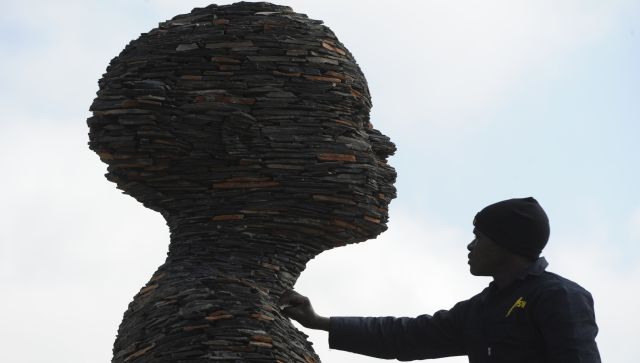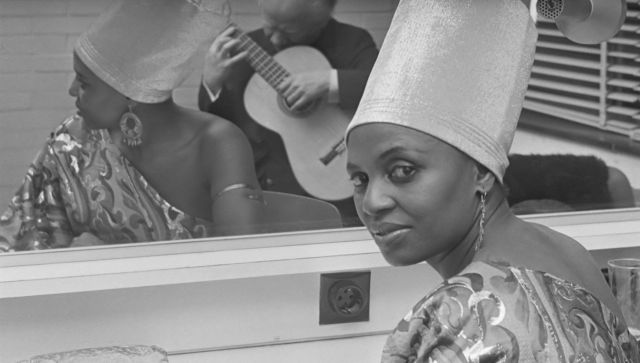“Can I get a oohe?” The peppy song “Makeba” is creating all the buzz these days. It’s the soundtrack to which more than 2.7 million reels are made on Instagram and TikTok. The 2015 number from French singer Jain has become a social media sensation. The repeated lines “Oohe” and then “Makeba, Makeba ma qué bella” is what the world seems to be grooving to. But there is a lot more to the song than its catchy tune. The “Makeba” song Singer Jain was born in France but spent some years in Congo. The song mentions Miriam Makeba, a singer and songwriter from South Africa and one of the world’s most popular anti-apartheid activists. She was fondly called “Mama Africa”. Jain sings, “I wanna see you sing, I wanna see you fight/Cause you are the real beauty of human rights” in a tribute to Makeba, who passed away in 2008. While the reels feature the first few lines of the song, the lyrics go, “Nobody can beat the Mama Africa/You follow the beat that she’s going to give ya/Only her smile can all make it go/The sufferation of a thousand more”. The song, written and performed by Jain, is part of her debut album “Zanaka”. The lyrics are mostly in English except for the phrase “ma che bella”, which means “how beautiful” in Italian. The song celebrates the beauty of human rights and calls for unity. It’s an ode to the rich culture of Africa with elements of pop reggae and traditional rhythms.
The life of Miriam Makeba Zenzi Miriam Makeba was born on 4 March 1932 in Johannesburg during a time of economic depression. Her mother was a domestic worker and her father was a clerk. She grew up Mbombela, formerly Nelspruit. Her father died when she was five and her mother struggled to make ends meet. Makeba helped her in cleaning houses. From a young age, she would love to sing at church. Her musical career began when she started singing in her cousin’s band. But it was in the 1950s that she earned a name after the joined a group the “Manhattan Brothers”. Later, she acted in two films – Come Back Africa and King Kong – which made her famous in the West. The former depicted discrimination faced by Black South Africans in the country. Makeba went to New York in 1959 and married her King Kong co-star, Hugh Masekela, in 1964. In the United States, singer Harry Belafonte became her mentor and longtime collaborator. She was invited to sing at the birthday party of President John F Kennedy at Madison Square Garden in 1962. Belafonte and Makeba won a Grammy Award in 1965 for “An Evening with Belafonte/Makeba”. [caption id=“attachment_12831592” align=“alignnone” width=“640”] Miriam Makeba during her last performance in Castelvolturno, near Naples in November 2008. AFP[/caption] Makeba and activism It was not only the singing but also the content of her songs that caught the world’s attention. She sang about apartheid and injustices, which did not go down with the South African authorities. Her passport was revoked, denying her possible return to the country and she lived in exile in the US. However, Makeba insisted that she was not a “political singer” and that her music was about her life experiences. While the world became more familiar with life under apartheid through the songs, she told The Guardian in an interview, “People think I consciously decided to tell the world what was happening in South Africa. No! I was singing about my life, and in South Africa we always sang about what was happening to us – especially the things that hurt us.” The singer sang at several political rallies including gatherings of Martin Luther King. In 1960, Makeba could not return to South Africa after her mother’s death. But this did not stop her from making herself heard. In 1963, she testified about apartheid at the United Nations after which her South African citizenship was taken away. In 1971, she spoke at the United Nations General Assembly. [caption id=“attachment_12831612” align=“alignnone” width=“640”]
 A worker repairs a statue representing South African singer and anti-apartheid activist Miriam Makeba in Atteridgeville, near Pretoria. File photo/AFP[/caption] In journalist Gwen Ansell’s book Soweto Blues, the late Hugh Masekela writes, “There’s nobody in Africa who made the world more aware of what was happening in South Africa than Miriam Makeba. This was because of the way in which she described the songs… unwittingly she educated African American artists.” However, Makeba’s activism was not restricted to her songs and testimonies. She refused to straighten her hair or endorse skin-whitening products. “Her aesthetic of natural hair and minimal make up (if any at all) communicated eloquently her strong sense of self, rooted in her African identity free from the expectations of western notions of beauty and acceptability,” an essay in The Conversation says. For decades she lived outside South Africa but she never shied away from her identity. She returned to her country in 1990 after the end of the apartheid regime. In 2008, Makeba died after collapsing at a concert in Italy organised to support Robert Saviano, an author who received death threats to fight organised crime. In touching tribute, Nelson Mandela said, “Her haunting melodies gave voice to the pain of exile and dislocation which she felt for 31 long years. At the same time, her music inspired a powerful sense of hope in all of us.” Makeba is gone but her legacy lives on – through her songs and now viral reels. With inputs from agencies Read all the Latest News , Trending News ,
Cricket News , Bollywood News , India News and Entertainment News here. Follow us on
Facebook,
Twitter and
Instagram.
A worker repairs a statue representing South African singer and anti-apartheid activist Miriam Makeba in Atteridgeville, near Pretoria. File photo/AFP[/caption] In journalist Gwen Ansell’s book Soweto Blues, the late Hugh Masekela writes, “There’s nobody in Africa who made the world more aware of what was happening in South Africa than Miriam Makeba. This was because of the way in which she described the songs… unwittingly she educated African American artists.” However, Makeba’s activism was not restricted to her songs and testimonies. She refused to straighten her hair or endorse skin-whitening products. “Her aesthetic of natural hair and minimal make up (if any at all) communicated eloquently her strong sense of self, rooted in her African identity free from the expectations of western notions of beauty and acceptability,” an essay in The Conversation says. For decades she lived outside South Africa but she never shied away from her identity. She returned to her country in 1990 after the end of the apartheid regime. In 2008, Makeba died after collapsing at a concert in Italy organised to support Robert Saviano, an author who received death threats to fight organised crime. In touching tribute, Nelson Mandela said, “Her haunting melodies gave voice to the pain of exile and dislocation which she felt for 31 long years. At the same time, her music inspired a powerful sense of hope in all of us.” Makeba is gone but her legacy lives on – through her songs and now viral reels. With inputs from agencies Read all the Latest News , Trending News ,
Cricket News , Bollywood News , India News and Entertainment News here. Follow us on
Facebook,
Twitter and
Instagram.


)

)
)
)
)
)
)
)
)



